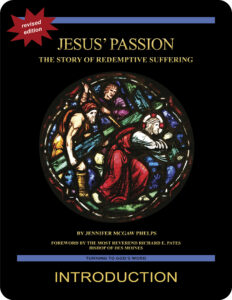 Jesus’ Passion:
Jesus’ Passion:
The Story of Redemptive Suffering
Introduction For God So Loved the World
Revised Standard Version Catholic Edition (RSVCE)*
New American Bible Revised Edition (NABRE)*
Catechism of the Catholic Church
ex libris (in our library)
Aperuit Illis (Instituting the Sunday of the Word of God)
Tami Palladino’s visual-meditation journal
This material coordinates with the Introduction on pages 6–8 in Jesus’ Passion: The Story of Redemptive Suffering.
“For God so loved the world that he gave his only Son, that whoever believes in him should not perish but have eternal life.”—the Gospel According to John 3:16 (RSVCE)**
welcome to our annual Lenten Bible study
We invite readers to become acquainted with Turning to God’s Word Catholic Bible studies through Jesus’ Passion: The Story of Redemptive  Suffering, which was granted
Suffering, which was granted  an imprimatur in 2014. In 2025, the free digital version of this popular Turning to God’s Word Catholic Bible study will be posted from Ash Wednesday, March 5, through Easter Sunday, April 20. If you have a question or comment about this or any other Turning to God’s Word Catholic Bible study, click on one of the “ask us your question” or “what do you think” buttons on any online study page.
an imprimatur in 2014. In 2025, the free digital version of this popular Turning to God’s Word Catholic Bible study will be posted from Ash Wednesday, March 5, through Easter Sunday, April 20. If you have a question or comment about this or any other Turning to God’s Word Catholic Bible study, click on one of the “ask us your question” or “what do you think” buttons on any online study page.
about Jesus’ Passion: The Story of Redemptive Suffering
Jesus’ Passion: The Story of Redemptive Suffering has been translated into more than 25 languages and has become a Lenten companion to thousands of  people around the world. Turning to God’s Word is pleased to be able to share a digital version of this popular Catholic Bible study with visitors to our website each year during Lent.
people around the world. Turning to God’s Word is pleased to be able to share a digital version of this popular Catholic Bible study with visitors to our website each year during Lent.
Based on the Scripture passages that underlie the 2004 movie The Passion of the Christ, our five-week Bible study provides a way to focus on the events surrounding Jesus’ Passion, death, and Resurrection. The second edition, which includes all of the original material, also contains a number of new features in a more reader-friendly format. Of special interest are the “Movie Notes,” which clearly identify and explain scenes in the related film The Passion of the Christ that aren’t based on Scripture. The digital edition links to several hundred individual Scripture citations and paragraphs from the Catechism of the Catholic Church, as well as to relevant magisterial documents mentioned in the lessons. This free digital edition of Jesus’ Passion: The Story of Redemptive Suffering can be downloaded from our website each year from Ash Wednesday through Easter Sunday.
every Turning to God’s Word Bible study carries an imprimatur
 Jesus’ Passion: The Story of Redemptive Suffering was granted an imprimatur by
Jesus’ Passion: The Story of Redemptive Suffering was granted an imprimatur by  the Most Reverend Richard E. Pates, (left), bishop emeritus of the Diocese of Des Moines, on February 18, 2014; the censor librorum for the Diocese of Des Moines, the Very Reverend Aquinas Nichols, granted the nihil obstat. These are official declarations that a book or pamphlet is free of
the Most Reverend Richard E. Pates, (left), bishop emeritus of the Diocese of Des Moines, on February 18, 2014; the censor librorum for the Diocese of Des Moines, the Very Reverend Aquinas Nichols, granted the nihil obstat. These are official declarations that a book or pamphlet is free of  doctrinal or moral error. There’s no implication that those who’ve granted the imprimatur and nihil obstat agree with the contents, opinions, or statements expressed in the work. All Turning to God’s Word Catholic Bible studies are submitted to the Church before publication. Visit the archives of Lost in Translation to read more about the Latin terms imprimatur & nihil obstat. Turning to God’s Word Catholic Bible studies written after 2020 are being submitted to the Most Reverend William M. Joensen, Ph.D. (right), bishop of the Diocese of Des Moines.
doctrinal or moral error. There’s no implication that those who’ve granted the imprimatur and nihil obstat agree with the contents, opinions, or statements expressed in the work. All Turning to God’s Word Catholic Bible studies are submitted to the Church before publication. Visit the archives of Lost in Translation to read more about the Latin terms imprimatur & nihil obstat. Turning to God’s Word Catholic Bible studies written after 2020 are being submitted to the Most Reverend William M. Joensen, Ph.D. (right), bishop of the Diocese of Des Moines.
watch the film, study the Scriptures
Jesus’ Passion: The Story of Redemptive Suffering can be used as a stand-alone Catholic Bible study or in conjunction with the film. The movie divides into five sections approximately 25 minutes long. Each is tied to one of the lessons in the Bible study. You can find detailed instructions about where to start and stop watching the film under “Movie Notes” on page 7 in the study, part of the Introduction to Jesus’ Passion: The Story of Redemptive Suffering. Turning to God’s World has no part in licensing of the film. Check elsewhere online to learn options for watching The Passion of the Christ.
you don’t have to watch the movie
Although The Passion of the Christ is among the highest-grossing R-rated movies of all time in North America, the film isn’t everyone’s cup of tea. Some people are overwhelmed by watching such a vivid visualization of Jesus’ suffering. The Turning to God’s Word Catholic Bible study Jesus’ Passion: The Story of Redemptive Suffering was written as a Lenten Bible study that can be used with or without the film. Most groups begin each session by showing the relevant 25-minute segment of the film. People who prefer not to see the movie join their groups afterward for discussion of the related biblical text.
the popes inspire us—serious Catholics study the Word of God
In his apostolic letter Aperuit Illis (Instituting the Sunday of the Word of God) issued motu proprio (of his  own accord), Pope Francis established the Third Sunday in Ordinary Time to be devoted to the celebration, study, and dissemination of the Word of God. The Holy Father’s apostolic letter was published on September 30, 2019, the feast of St. Jerome and the 1600th anniversary of the saint’s death. St. Jerome, who translated the Latin
own accord), Pope Francis established the Third Sunday in Ordinary Time to be devoted to the celebration, study, and dissemination of the Word of God. The Holy Father’s apostolic letter was published on September 30, 2019, the feast of St. Jerome and the 1600th anniversary of the saint’s death. St. Jerome, who translated the Latin 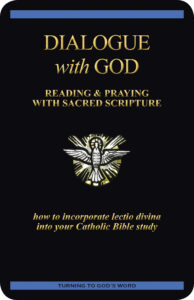 Vulgate Bible from Greek and Hebrew manuscripts, is famous for saying: “Ignorance of Scripture is ignorance of Christ.” In Aperuit Illis, the Holy Father calls attention to the sacramental nature of the Word of God, pointing to the unbreakable bond between Sacred Scripture and the Eucharist. In 2025, the Church will celebrate the Word of God on Sunday, January 26. We’ve posted a free digital version of Dialogue with God: Reading & Praying with Sacred Scripture, our guide to incorporating the Church’s traditional practice of lectio divina (sacred reading) into regular Bible study.
Vulgate Bible from Greek and Hebrew manuscripts, is famous for saying: “Ignorance of Scripture is ignorance of Christ.” In Aperuit Illis, the Holy Father calls attention to the sacramental nature of the Word of God, pointing to the unbreakable bond between Sacred Scripture and the Eucharist. In 2025, the Church will celebrate the Word of God on Sunday, January 26. We’ve posted a free digital version of Dialogue with God: Reading & Praying with Sacred Scripture, our guide to incorporating the Church’s traditional practice of lectio divina (sacred reading) into regular Bible study.
ex libris—read more Church documents
Find links to magisterial documents referred to in Turning to God’s Word Catholic Bible  studies, including Aperuit Illis (Instituting the Sunday of the Word of God), at ex libris—magisterial documents. The page lists significant recent encyclicals as well as a number of historical Church documents.
studies, including Aperuit Illis (Instituting the Sunday of the Word of God), at ex libris—magisterial documents. The page lists significant recent encyclicals as well as a number of historical Church documents.
a few reminders about Turning to God’s Word Bible studies
The most distinguishing feature of our Bible studies is that they’re Catholic. Each one has been granted an imprimatur, which means that a bishop has read the work and found nothing contrary to Church teaching on morals or faith. Note that the imprimatur makes no claim that a work is equivalent to Church teaching, simply that it isn’t opposed to what the Church teaches. Practically speaking, this means that you don’t have to accept Turning to God’s Word interpretations of Scripture, only that choosing to do so doesn’t amount to heresy. Choosing not to accept conclusions of a work that’s been granted an imprimatur doesn’t immediately plunge you into heretical territory, but choosing not to accept Church teaching related to those conclusions does.
read the Catechism—how to avoid heresy
The imprimatur reinforces and validates the claim that Turning to God’s Word Bible studies are Catholic. All participants have a right to expect that discussions about our Bible studies will focus on Catholic teaching. That doesn’t mean that someone won’t occasionally have a question about Church teaching. Not knowing what the Church teaches about a particular issue isn’t heretical. Asking a question about Church teaching isn’t heretical. Failing to understand Church teaching isn’t heretical. Insisting that Church teaching is wrong is.
 Most people who begin to study Jesus’ Passion are caught off guard by how many challenging theological ideas are found in Scripture. There are a many things a great number of Catholics believe to be Church teaching that actually are not. In this study, we attempt to present Scripture and Church teaching related to Jesus’ Passion as unambiguously as possible. When in doubt, you can refer to the Catechism of the Catholic Church or talk with your parish priest about any doctrine that remains unclear.
Most people who begin to study Jesus’ Passion are caught off guard by how many challenging theological ideas are found in Scripture. There are a many things a great number of Catholics believe to be Church teaching that actually are not. In this study, we attempt to present Scripture and Church teaching related to Jesus’ Passion as unambiguously as possible. When in doubt, you can refer to the Catechism of the Catholic Church or talk with your parish priest about any doctrine that remains unclear.
If a Church teaching seems particularly unsettling even after studying the Catechism and speaking with someone who’s knowledgeable regarding Catholic doctrine, you might want to examine whether there might be a personal or emotional reason why you’re having difficulty. Pray for God’s guidance and be open to receiving a different answer than you anticipated, possibly at a later time than you expected or hoped.
be respectful of the others in your group
Keep in mind that most people in your discussion group are there for a Catholic interpretation of Scripture. People from other faith backgrounds are welcome, but the focus of any Turning to God’s Word study always is going to be Catholic in nature. The following opening prayer emphasizes maintaining mutual respect amid differences of opinion:
Heavenly Father, send forth your Spirit to enlighten our minds
and dispose our hearts to accept your truth.
Help us to listen to one another with openness and honesty,
eager to learn from the talents and intuitions that you have given each of us.
Never let differences of opinion diminish our mutual esteem and love.
May we leave this meeting with more knowledge and love for you and your Son.
In the unity of the Holy Spirit, Amen.
You can find other opening prayers on our website. We especially like the following:
Lord Jesus, you promised to send your Holy Spirit to teach us all things.
As we read and study your word today,
allow it to touch our hearts and change our lives. Amen.
WHAT DO YOU THINK about interpreting Scripture?
 The Church encourages Catholics to read and interpret Scripture on our own as long as we follow these two rules:
The Church encourages Catholics to read and interpret Scripture on our own as long as we follow these two rules:
1) Our interpretation can’t contradict anything else in Scripture.
2) Our interpretation can’t contradict Church teaching.
In order to comply, we need to know everything else that’s in the Bible as well as everything that the Church teaches. That’s a tall order, which is why each Turning to God’s Word Catholic Bible study is submitted to the Church for an imprimatur. The imprimatur for Jesus’ Passion: The Story of Redemptive Suffering is a guarantee that the Church finds nothing objectionable in the work. You’re free to agree with interpretations in Jesus’ Passion: The Story of Redemptive Suffering, but it’s not essential that you do so. There are many different interpretations in other commentaries, but very few of them carry an imprimatur. This doesn’t mean that they necessarily pose any problems in regard to Catholic doctrine or moral teaching, but there’s no Church guarantee that they don’t.
When considering opinions that haven’t been granted an imprimatur, don’t be afraid to ask questions. Our Bible studies address some common interpretations, but there are innumerable opinions floating around about the meaning of different passages in the Bible—including those about Jesus’ Passion.
 ? Here’s the first question to ask about an opinion expressed in any commentary: How closely does it adhere to what we can read in the biblical text?
? Here’s the first question to ask about an opinion expressed in any commentary: How closely does it adhere to what we can read in the biblical text?
? Do viewpoints about the meaning of the Bible passages contradict anything else you already know from Scripture?
? Do they contradict anything from Church teaching? The Catechism of the Catholic Church addresses a large number of questions related to common Scripture interpretations.
 Passion—you could look it up in our archives
Passion—you could look it up in our archives
Christians often talk about Jesus’ “Passion” without giving much thought to the meaning of the word. To learn about the close relationship between passion and suffering, read Lost in Translation, an online column in which Turning to God’s Word author Matthew Phelps helps readers connect with ideas expressed in the original languages of the Scriptures. New Lost in Translation entries are posted on Mondays, and past entries are archived on our website. Contact us if you’d like to receive Lost in Translation by email every week.
WHAT DO YOU EXPECT from this Bible study?
The theological virtue of hope is what leads Christians to have an expectation of salvation.
 ? How might focusing on Jesus’ Passion during Lent strengthen faith?
? How might focusing on Jesus’ Passion during Lent strengthen faith?
? What’s one area of your life in which you as well as other Christians might especially need to seek God’s help?
? What questions might people have about Scripture related to Jesus’ Passion?
? Consider how Christian repentance differs from the repentance practiced in the Old Testament.
? How can an individual determine if they’re sincerely repentant?
ex libris—learn more about Jesus’ Passion, death & Resurrection

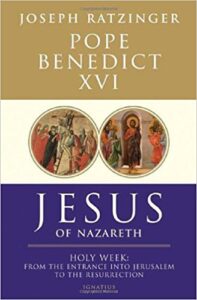 Jesus of Nazareth: Holy Week is one of three books in a series about Jesus in the Gospels. Written by Pope Benedict XVI, it looks at the decisive events that are the focus of Jesus’ last week on earth. The Scripture covered begins with Jesus’ entrance into Jerusalem and continues through the time of his Resurrection. Read excerpts and learn more about the Jesus of Nazareth trilogy and other works related to Bible study at ex libris—main bookshelf.
Jesus of Nazareth: Holy Week is one of three books in a series about Jesus in the Gospels. Written by Pope Benedict XVI, it looks at the decisive events that are the focus of Jesus’ last week on earth. The Scripture covered begins with Jesus’ entrance into Jerusalem and continues through the time of his Resurrection. Read excerpts and learn more about the Jesus of Nazareth trilogy and other works related to Bible study at ex libris—main bookshelf.
another video—one that could change the way you approach the Bible (40:44)
 Even if you’re a veteran of Catholic Bible studies, we encourage you to watch an explanation of the practical benefits of approaching The Bible as the Living Word of God. This 40-minute video is distilled from a talk that Turning to God’s Word author Matthew Phelps gave at a summer Bible study retreat at Conception Abbey in Conception, Missouri. In this video, Matthew looks at how viewing Scripture as a living document can help us to develop a more intimate relationship with Jesus Christ. There are benefits in setting aside what we think we know about Scripture to approach the Bible with the goal of learning what new things God is saying to us. Matthew examines the principles of lectio divina, the traditional Catholic approach to reading and praying with Scripture that’s foundational for all Turning to God’s Word Bible studies.
Even if you’re a veteran of Catholic Bible studies, we encourage you to watch an explanation of the practical benefits of approaching The Bible as the Living Word of God. This 40-minute video is distilled from a talk that Turning to God’s Word author Matthew Phelps gave at a summer Bible study retreat at Conception Abbey in Conception, Missouri. In this video, Matthew looks at how viewing Scripture as a living document can help us to develop a more intimate relationship with Jesus Christ. There are benefits in setting aside what we think we know about Scripture to approach the Bible with the goal of learning what new things God is saying to us. Matthew examines the principles of lectio divina, the traditional Catholic approach to reading and praying with Scripture that’s foundational for all Turning to God’s Word Bible studies.
visual meditation is a form of prayer
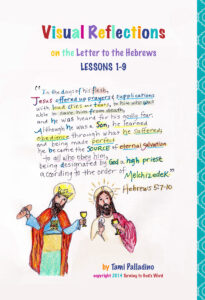 If you like to draw, consider illustrating your prayers for Jesus’ Passion: The Story of Redemptive Suffering.
If you like to draw, consider illustrating your prayers for Jesus’ Passion: The Story of Redemptive Suffering.  Check out the visual-meditation journal of Turning to God’s Word co-founder Tami Palladino, which she created to accompany The Letter to the Hebrews: An Explanation of the Mechanism of Our Salvation. Tami also illustrated Sing a New Psalm: Communicating with God Through the Prayers of the Church—Volume I: Lauds & Vespers and The Revelation of Jesus Christ: The Faithful Witness, and some lessons in You Shall Have No Other Gods: The Book of Exodus and In the Beginning: The Book of Genesis.
Check out the visual-meditation journal of Turning to God’s Word co-founder Tami Palladino, which she created to accompany The Letter to the Hebrews: An Explanation of the Mechanism of Our Salvation. Tami also illustrated Sing a New Psalm: Communicating with God Through the Prayers of the Church—Volume I: Lauds & Vespers and The Revelation of Jesus Christ: The Faithful Witness, and some lessons in You Shall Have No Other Gods: The Book of Exodus and In the Beginning: The Book of Genesis.
an insightful quote about the film
Prolific Catholic author Peter Kreeft, in recommending “10 Books Nobody Should Be Allowed To Die Without Reading” (he actually ends up giving the nod to more than three times that number), comments: “I don’t consider The Passion of the Christ to be a movie. It’s a liturgy. It’s a time machine. It takes you back 2,000 years. It’s a miracle.” Quite a few Christians agree.
study the Bible anywhere
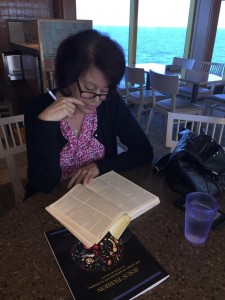
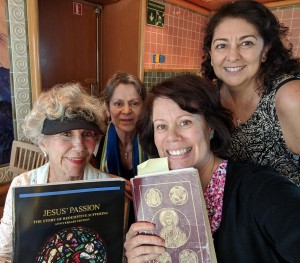 These members of the Belmont Women’s Catholic Scripture Study in the San Francisco Bay Area took Jesus’ Passion: The Story of Redemptive Suffering with them on a cruise. Even a view of the gorgeous blue sea didn’t distract Turning to God’s Word co-founder Tami Palladino (left) from reading her Bible. The group snapped this selfie (picture right, group members from left: Rose, Martha, Tami, and Denise) after their discussion of Lesson 1. Tami shared that the group liked contrasting the way that the different Evangelists treated the beginning events connected with Jesus’ Passion. Denise commented that the questions brought out relevant comparisons to encourage contemplation. Tami also reported that the group appreciated the emphasis on the Scripture, which allowed them to do the lesson without having shipboard access to the film, The Passion of the Christ. You go, girls!
These members of the Belmont Women’s Catholic Scripture Study in the San Francisco Bay Area took Jesus’ Passion: The Story of Redemptive Suffering with them on a cruise. Even a view of the gorgeous blue sea didn’t distract Turning to God’s Word co-founder Tami Palladino (left) from reading her Bible. The group snapped this selfie (picture right, group members from left: Rose, Martha, Tami, and Denise) after their discussion of Lesson 1. Tami shared that the group liked contrasting the way that the different Evangelists treated the beginning events connected with Jesus’ Passion. Denise commented that the questions brought out relevant comparisons to encourage contemplation. Tami also reported that the group appreciated the emphasis on the Scripture, which allowed them to do the lesson without having shipboard access to the film, The Passion of the Christ. You go, girls!
read the Catechism—many questions are based on it
Though the movie The Passion of the Christ is heavily based on the Gospel accounts of Jesus’ Passion, even some of the details that are an accepted part of Catholic tradition aren’t biblical. Several of the traditional Catholic Stations of the Cross, for example, aren’t directly mentioned anywhere in the Scriptures. The repeating “Movie Notes” feature in this Bible study addresses these non-biblical scenes. The primary commentary and all of the questions are based on biblical texts and teaching found in the Catechism of the Catholic Church.
Q&A—where to find some answers
Some people are used to doing Bible studies from other publishers, and they’ve told us that they miss the answer keys many of those studies offer. One leader even admitted that she relied on answer keys so she didn’t have to spend time doing Bible study lessons herself. We sympathize with omnipresent time constraints, but we maintain that up-front answer keys provide people with a strong temptation to rely on someone else’s idea of what Scripture means instead of thinking more deeply about what God might be trying to say to each of us as individuals at a particular moment in time.
 Q: Why don’t Turning to God’s Word Catholic Bible studies provide any printed answer keys?
Q: Why don’t Turning to God’s Word Catholic Bible studies provide any printed answer keys?
A: The Turning to God’s Word method of Bible study is dependent on participants directly engaging with the biblical text and looking to that text for answers to their questions. All of the factual questions in the lessons can be answered from the Scriptures. Sidebars in the lessons contain supplemental material written to help explain some of the themes suggested by the biblical text. Most of our studies, including this one, feature videos with each lesson.
Outside commentaries can shed light on individual texts, but many commentaries examine Scripture passages out of context. Some may focus on an academic rather than a spiritual approach to the Bible. If you’re confused about anything in our studies or in any related outside commentaries, we encourage you to browse our website for more information.
The goal of all Turning to God’s Word Catholic Bible studies is to foster personal reflection leading to a more intimate relationship with Jesus. Consequently, each lesson contains  reflection questions, and these necessarily don’t have any “right” or “wrong” answers. If you’d like to share your thoughts about any of our studies or need clarification about a question, commentary, or video related to the lessons, contact us using the “ask us your question” or “what do you think” button on any online lesson page. Because others may have the same concern, we routinely turn questions and comments we receive into anonymous Q&A items and add them to the relevant online study pages.
reflection questions, and these necessarily don’t have any “right” or “wrong” answers. If you’d like to share your thoughts about any of our studies or need clarification about a question, commentary, or video related to the lessons, contact us using the “ask us your question” or “what do you think” button on any online lesson page. Because others may have the same concern, we routinely turn questions and comments we receive into anonymous Q&A items and add them to the relevant online study pages.
Q&A—three questions about Bible translations
We’re frequently asked what translation of the Bible is best. Sometimes we’re asked which translation is approved to be read at Catholic Masses. More infrequently we’re asked why we’ve chosen to reprint the Revised Standard Version Second Catholic Edition (RSV2CE) for the biblical text in our printed studies.
Q1: Which translation of the Bible is the best one for Catholics to read? 
A2: As far as which translation is best, we maintain that reading any translation of the Bible you have on hand is a great place to start. The old adage “every translator is a traitor” certainly applies to Scripture, but God’s basic message to his people can be found in any Bible. While there are English-language Bibles catering to a variety of special-interest Catholic groups, they generally reprint either a translation of the New American Bible Revised Edition (the NABRE) or a Catholic edition of the Revised Standard Version (the RSVCE or the RSV2CE), which are the Bibles read by most American Catholics. Both of these translations rely on archeological finds and scholarship that were unavailable in earlier centuries. Before the mid-1960s, many Catholics were familiar with the Douay-Rheims English translation, which was based on the Latin Vulgate. Originally translated by St. Jerome in the late 4th century, a version of the Vulgate has remained the official Latin translation of the Catholic Church since the 16th century. Before the mid-1960s, most Protestants read The King James Version.
As people become more interested in Scripture study, they also become more interested in reading the “right” Bible. Since very few of us are proficient in ancient languages, we’re forced to rely on the work of scholars who’ve spent years studying Hebrew, Greek, Aramaic, and Latin. In many cases, there simply isn’t an easy way to translate some of the original words and phrases of Scripture into English. The best advice we can offer is to choose an English translation that the Church has approved. The United States Conference of Catholic  Bishops (USCCB) offers guidelines. When questions arise, as they undoubtedly will, check out footnotes, commentaries, and other translations; talk to a knowledgeable priest; and—this part is most important—ask God to grant you increased understanding. You also can email us with your questions about Scripture. In many cases, Turning to God’s Word author Matthew Phelps’ background in classical languages proves helpful. We frequently rely on him to shed some light on the linguistics involved in difficult passages.
Bishops (USCCB) offers guidelines. When questions arise, as they undoubtedly will, check out footnotes, commentaries, and other translations; talk to a knowledgeable priest; and—this part is most important—ask God to grant you increased understanding. You also can email us with your questions about Scripture. In many cases, Turning to God’s Word author Matthew Phelps’ background in classical languages proves helpful. We frequently rely on him to shed some light on the linguistics involved in difficult passages.
Q2: I’m having trouble locating the same Bible that I hear read at Mass. What translation is that?
A2: The Catholic Lectionary, a collection of biblical texts approved for liturgical use, isn’t the same as a Bible. The English-language lectionary used in the United States is primarily based on a 1970 translation. A close English translation outside the lectionary is the New American Bible Revised Edition (NABRE). The United States Conference of Catholic Bishops (USCCB) currently is working on a liturgical Bible based on the NABRE translation.
Q3: Why has Turning to God’s Word chosen to reprint biblical text from the Revised Standard Version Second Catholic Edition (RSV2CE) instead of the New American Bible Revised Edition (NABRE)?
A3: We currently use the Revised Standard Version Second Catholic Edition (RSV2CE) as our primary biblical translation in our printed studies because scholars consider it to be a more faithful word-for-word translation than many other translations. Pope Benedict XVI quotes from the RSV2CE in his three-volume book, Jesus of Nazareth. The RSVCE is the Bible translation used in English translations of the Catechism of the Catholic Church. The RSV2CE varies only slightly from the earlier RSVCE, which we link to on our online study pages. Any discrepancies between the RSV2CE and the RSVCE are pointed out on the online study pages. Turning to God’s Word cites The Abbey Psalms and Canticles in references to the Psalms in all of our printed studies.
pray with the Psalms—intensely emotional prayers
Although some scholars question David’s authorship of the Psalms, it remains indisputable that many of the Psalms address  themes related to events that occurred during the period when David ruled over the descendants of Jacob. Reading and praying with the Psalms offers insight into the minds and hearts of people who lived during the time of David—who lived long afterward as well. These prayers express universal human feelings every bit as relevant to us in the present day as when the Psalms first were composed.
themes related to events that occurred during the period when David ruled over the descendants of Jacob. Reading and praying with the Psalms offers insight into the minds and hearts of people who lived during the time of David—who lived long afterward as well. These prayers express universal human feelings every bit as relevant to us in the present day as when the Psalms first were composed.
don’t get confused—Psalms numbering varies
Numbering of many of the Psalms and their verses varies from one translation to another. Parallel  numbering for commonly used Catholic Bibles is noted in the citations index located at the back of Jesus’ Passion: The Story of Redemptive Suffering. For more information about why the numbering varies in some translations, see the Q&A on the online study page for Lesson 1 Set a Guard on My Mouth in the Turning to God’s Word Catholic Bible study Sing a New Psalm: Communicating with God Through the Prayers of the Church—Volume I: Lauds & Vespers.
numbering for commonly used Catholic Bibles is noted in the citations index located at the back of Jesus’ Passion: The Story of Redemptive Suffering. For more information about why the numbering varies in some translations, see the Q&A on the online study page for Lesson 1 Set a Guard on My Mouth in the Turning to God’s Word Catholic Bible study Sing a New Psalm: Communicating with God Through the Prayers of the Church—Volume I: Lauds & Vespers.
don’t forget about our indexes & extra online material

 If you’re trying to locate information about a passage in Scripture, you can look it up in the index at the back of the study book. If you want to revisit a particular commentary, you can look that up by title in the topics index. If you want to learn more about another book of the Bible for which there’s a Turning to God’s Word study, you can read the online commentaries and watch any accompanying videos by going to the online study directories. (There are no videos with Jesus’ Passion: The Story of Redemptive Suffering.) Finally, if you have a question or would like to make a comment about any of our studies, you can use one of the “ask us your question” or “what do you think” buttons to email our authors.
If you’re trying to locate information about a passage in Scripture, you can look it up in the index at the back of the study book. If you want to revisit a particular commentary, you can look that up by title in the topics index. If you want to learn more about another book of the Bible for which there’s a Turning to God’s Word study, you can read the online commentaries and watch any accompanying videos by going to the online study directories. (There are no videos with Jesus’ Passion: The Story of Redemptive Suffering.) Finally, if you have a question or would like to make a comment about any of our studies, you can use one of the “ask us your question” or “what do you think” buttons to email our authors.
ex libris—Church documents & books about religious topics
Link to magisterial documents referred to in our Bible studies at ex libris—magisterial documents.  This listing includes significant recent encyclicals as well as a number of historical Church documents. Recommended books related to Scripture study can be found at ex libris—main bookshelf.
This listing includes significant recent encyclicals as well as a number of historical Church documents. Recommended books related to Scripture study can be found at ex libris—main bookshelf.
memorize a favorite Bible verse (4:48)
Turning to God’s Word co-founder Tami Palladino has created a short video about the benefits of memorizing Bible verses. Choosing a passage that you find particularly meaningful will make the task easier. There are inspiring verses in every book of the Bible, but some people in our Turning to God’s Word Catholic Bible studies like to memorize a verse from their lesson every week. For more ideas and helpful tips, check out Tami’s video, Why Memorize Scripture? It’s less than five minutes long.
close with Bible-based prayer related to this lesson
 Many groups conclude with a prayer based on Scripture, and some participants include Scripture-specific prayer in their individual study. If you’re uncomfortable composing your own Bible-based prayers, you can follow our four easy steps. If you prefer, you can use the following prayer based on the primary biblical texts that accompany this lesson in Jesus’ Passion: The Story of Redemptive Suffering.
Many groups conclude with a prayer based on Scripture, and some participants include Scripture-specific prayer in their individual study. If you’re uncomfortable composing your own Bible-based prayers, you can follow our four easy steps. If you prefer, you can use the following prayer based on the primary biblical texts that accompany this lesson in Jesus’ Passion: The Story of Redemptive Suffering.
O God, our Father, in your love for the world
you gave your only-begotten Son to ransom humanity from sin.
Give us a portion of the love that enabled your Son
to willingly embrace extreme suffering,
and to make salvation possible for all men and women.
We ask this in union with the Holy Spirit
and in the name of Jesus,
our model of perfect obedience to your will. Amen.
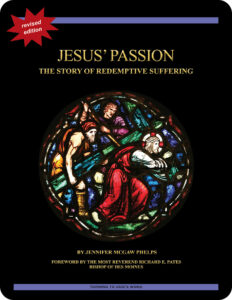 coming up in the next lesson
coming up in the next lesson
The online study page for Lesson 1 Agony in the Garden contains additional commentary, questions, and links to related material. The lesson roughly corresponds to the first 25 minutes of the film The Passion of the Christ. Links to the free digital version of the study will be available during Lent in 2025 (beginning on Ash Wednesday, March 5) and again during Lent in 2026.
Lesson 1 Agony in the Garden, the Gospel According to Matthew 26:36–54 and the Gospel According to John 18:1–14
you also may like our study of the Gospel According to John
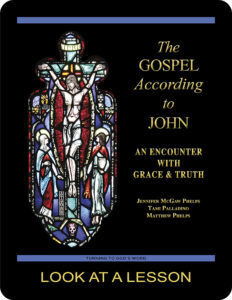 The Gospel According to John: An Encounter with Grace & Truth, a 25-lesson Catholic Bible study with an imprimatur, examines the Fourth Gospel’s view of Jesus Christ as the Son of God, with special emphasis on the institution of the sacraments of the Church as the means by which Christians are purified and made holy. This recently revised study includes maps and additional commentary, and takes a closer look at the way in which Jesus relates to individual men and women. Click on the book’s cover to view a sample lesson.
The Gospel According to John: An Encounter with Grace & Truth, a 25-lesson Catholic Bible study with an imprimatur, examines the Fourth Gospel’s view of Jesus Christ as the Son of God, with special emphasis on the institution of the sacraments of the Church as the means by which Christians are purified and made holy. This recently revised study includes maps and additional commentary, and takes a closer look at the way in which Jesus relates to individual men and women. Click on the book’s cover to view a sample lesson.
start a Turning to God’s Word Bible study
Thank you for your interest in Jesus’ Passion: The Story of Redemptive Suffering,  our annual free Lenten
our annual free Lenten  Bible study. Lessons can be downloaded from our website through Easter. Information about beginning a group study can be found at start a Bible study. Tami, Matthew, and I are available to answer questions about the Turning to God’s Word method of Catholic Bible study. You may use this email to contact us directly if you’re interested in starting another Turning to God study or in having your study schedule listed with other TtGW study groups on our website. —Jennifer
Bible study. Lessons can be downloaded from our website through Easter. Information about beginning a group study can be found at start a Bible study. Tami, Matthew, and I are available to answer questions about the Turning to God’s Word method of Catholic Bible study. You may use this email to contact us directly if you’re interested in starting another Turning to God study or in having your study schedule listed with other TtGW study groups on our website. —Jennifer
*There are seven deuterocanonical books in the Old Testament—the Books of Tobit, Judith, Wisdom, Sirach, Baruch, and First and Second Maccabees, as well as some passages in the Books of Esther and Daniel. Protestants usually refer to these works as “apocryphal,” a word that means “outside the (Protestant) canon” because they’re excluded from most Protestant Bibles. The word “deuterocanonical” means “second canon”; Catholics use that word to refer to any section of the Catholic Old Testament for which there are no extant, or existing, Hebrew manuscripts. All of the deuterocanonical books appear in the Septuagint, the earliest remaining versions of which date to the 1st century B.C. This Greek translation of the Old Testament was in common use by Jews at the time of Jesus. Learn more by reading How Do Catholic & Protestant Bibles Differ?
Turning to God’s Word printed Bible studies use the 2006 Revised Standard Version Second Catholic Edition (RSV2CE) translation for all Scripture references except those to the Psalms, which are taken from The Abbey Psalms and Canticles, prepared by the Benedictine monks of Conception Abbey and published in 2020 by the United States Conference of Catholic Bishops (USCCB). All Scripture links for the digital version of Jesus’ Passion: The Story of Redemptive Suffering are to the 1966 Revised Standard Version Catholic Edition (RSVCE) translation. The New International Version (NIV) audio recordings follow the same chapter and verse numbering as the RSV Catholic translations, but the NIV translation doesn’t include the deuterocanonical books and passages.
The 1966 RSVCE uses archaic pronouns and verb forms such as “thee,” “thou,” “didst” in the Psalms and in direct quotations attributed to God. The 2006 RSV2CE replaces these with more accessible English. The few significant translation changes in the RSV2CE include rendering almah as “virgin” in the Book of Isaiah 7:14 and restoring the term “begotten” in the Gospel According to John 3:16.
Numbering varies for some passages in this Bible study. Turning to God’s Word studies follow the numbering in the Revised Standard Version Catholic translations (RSV2CE and RSVCE). Discrepancies in the New American Bible Revised Edition (NABRE) are noted in the Index of Scripture Citations.
 You can learn more about the Psalms by viewing a sample lesson from the Turning to God’s Word Catholic Bible study Sing a New Psalm: Communicating with God Through the Prayers of the Church—Volume I: Lauds & Vespers. The second part of that study, Sing a New Psalm: Communicating with God Through the Prayers of the Church—Volume II: Vigils, Day Prayer & Compline, is scheduled for publication in 2025. Some verse numbers may vary in different translations of the Psalms.
You can learn more about the Psalms by viewing a sample lesson from the Turning to God’s Word Catholic Bible study Sing a New Psalm: Communicating with God Through the Prayers of the Church—Volume I: Lauds & Vespers. The second part of that study, Sing a New Psalm: Communicating with God Through the Prayers of the Church—Volume II: Vigils, Day Prayer & Compline, is scheduled for publication in 2025. Some verse numbers may vary in different translations of the Psalms.
**The Gospel According to John 3:16 (RSV2CE) reads: “For God so loved the world that he gave his only-begotten Son, that whoever believes in him should not perish but have eternal life.”
